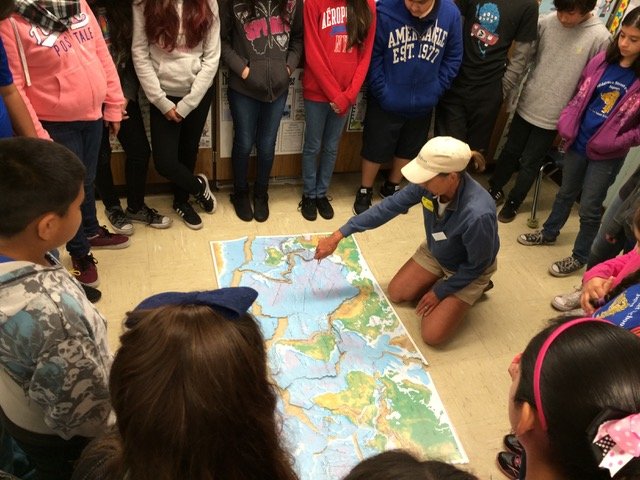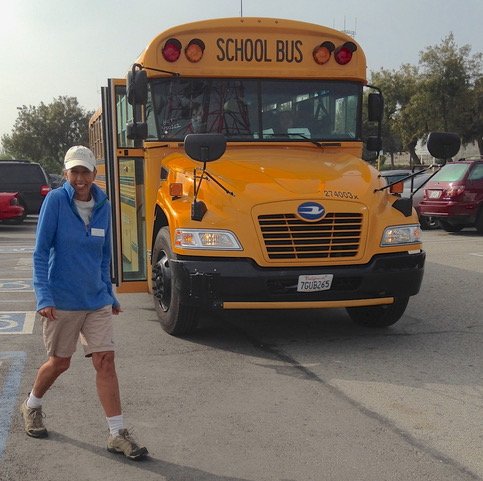Celebrating 25 Years in Outdoor Education: A Q&A with Cindy Hardin on Environmental Education and Unforgettable Experiences






As we celebrate Cindy’s remarkable 25 years in outdoor education, we take a moment to reflect on her extraordinary journey and the profound impact she has made in the field of environmental education. Over the decades, Cindy has dedicated herself to inspiring countless individuals to connect with nature and understand the importance of preserving natural spaces. In the following Q&A, Cindy shares her insights, experiences, and the lessons she has learned along the way.
Q: What initially drew you to environmental education, and how has your passion evolved over the past 25 years?
A: I attended a very progressive middle school. Every year the teachers would take all 200 (!) students to Yosemite. Our curriculum often referenced Yosemite. For example, for Social Studies, we learned about the Miwok and their practices. Geology was all about glaciers, terminal moraines, etc. The activism of John Muir and his advocacy for the environment was emphasized. Social justice was also a theme. One of our seventh-grade reading assignments was "Bury My Heart at Wounded Knee" which covered the 19th century genocide of Indigenous Peoples. In addition, I grew up within walking distance of the ocean and the Bolsa Chica Wetlands – the outdoors was a huge part of my life from early childhood. I also had an organic vegetable garden that I grew with my Dad in grade school. But the way I got started with my current work was when I answered a small advertisement in the LA Times seeking volunteers to provide nature education for children at the Ballona Wetlands.
Q: Reflecting on your career, what are some of the most memorable moments or experiences you've had while educating others?
A: Oh, there are so many! On almost every tour students tell us they learned so much, they had so much fun, they loved feeling like scientists at the Microscope Station – the list goes on and on. But one that really stands out was post the Fukushima Nuclear disaster in Japan. I was attending a birthday party for a friend whose son, Canyon, had participated in a tour when he was in third grade. We were discussing the disaster and the evidence that pieces of the destroyed plant were now reaching US shores. I said the bigger concern was not the structural materials washing up on the coast but . . .at which point Canyon said "It's the invasive species that are part of the debris." I was so surprised that a sixteen-year-old would be aware of this, so I asked him "Canyon, how did you know that?" He looked at me and said, "You taught me that!” Seven years later he still had that knowledge from that long ago field trip! I realized then that we can and do make an impact on our visitors, even though they are with us for such a short time on our tours.
Q: How has outdoor education changed over the past quarter-century, and what trends or developments do you foresee shaping its future?
A: Well, there's a lot more emphasis on the importance and fragility of the environment now, as things are in a rather dire situation. Schools are devoting more curriculum time to the subject, all the way up to the college level, which is a great thing. I don't think they even had an Environmental Studies major at mainstream universities 25 years ago! I feel there is still not enough time in the outdoors for students, but I am hopeful that is changing. The greening of school campuses is another trend that is gaining traction, and I hope to see that grow. But most importantly, moving away from using electronic screens and towards more hands-on, real-life experience is key for the future. I also see more awareness of providing outdoor learning activities for populations that have traditionally experienced difficulties with access to this kind of thing. Of course, we have been doing this since I started this work in 1999. Title I schools have always been our main focus on our field trips.
Q: Can you share a particularly challenging situation you encountered in your work and how you overcame it?
A: Firing a volunteer! Having to terminate anyone in a job is challenging, but to fire someone who is not a paid employee is especially weird and difficult. I have only had to do this three times in 25 years, and not recently, thank goodness. I think this has become less of an issue because over the years we have tightened up and clarified expectations and what is and isn't the nature of our programs.
Q: What strategies or methods have you found most effective in engaging diverse communities in environmental education?
A: The best strategy is kindness and making a sincere effort to make everyone feel welcome. It's so important to show enthusiasm for their presence and thank them for coming. Being able to invite them back again to attend an Open Wetlands event is also helpful. And I am always looking for teachers that are excited about our programs. One great educator can change the attitude of an entire school. When I run across one of these superstar teachers, I make an effort to create a sincere, reciprocal relationship with that person, so we can grow a partnership with them and their students. And the ability to cover transportation costs through grants and donations helps immeasurably to provide access.
Q: How do you stay motivated and inspired in your role after so many years?
A: The above-mentioned teachers and our fabulous volunteers are great motivation and inspiration. I also spend loads of time outdoors up and down our beautiful state of California, exploring different nature spots and observing how other entities fulfill their education missions. Swimming in the ocean every day always inspires a very local level!
Q: Throughout your career, what impact do you feel you've had on individuals, communities, or broader environmental initiatives?
A: Now and then I run into a student who has attended one of our field trips, and they always remember their trip and me, Miss Cindy. Some are in high school or college! I point out local nature to neighbors all the time, and it really does raise their awareness of the special qualities of the natural world. Raising awareness works, and I encourage advocacy in all who show the slightest interest. I know that people contact local political representatives and the Coastal Commission at my urging, with positive results.
Q: Are there any specific environmental issues or causes that you're particularly passionate about, and why?
A: The answer to that would of course be Ballona. I dearly love this space and will advocate for this and all wetlands (and my first love, the Ocean) forever. The Ocean and its adjacent wetlands are the lungs of the planet, and essential to its health. Providing public comment at the monthly Coastal Commission Meetings, writing letters on important issues, and supporting those who speak out both financially and morally are all steps I take to protect and enhance these precious habitats. The fact that only 3% of the seafloor has been mapped troubles me, as it seems to be the next target for the extraction industry. In the next few years advocacy for the Ocean is going to be extremely important.
Q: What advice would you give to someone just starting out in the field of environmental or outdoor education?
A: Get outside. Get your hands dirty. Make every person feel like they matter. Be patient. Don't expect to get rich, but know that you will sleep well at night in this line of work. Be patient with those who might not be as well-informed as you would like. When you do find like-minded individuals, cultivate that relationship. Try to always be helpful. Speak up to various governmental agencies that make decisions about the environment. Visit with other groups and learn from their approach. Make plenty of time for your own outdoor experiences. Learn a little bit about policy, and who makes the decisions that affect the environment. Always be respectful when speaking to those who might have an adversarial opinion. Stay with a job long enough to really learn the ins and outs - not just to pad your resume. And keep your energy positive as best you can.
Q: Looking ahead, what are your hopes and aspirations for the next phase of your career within the organization?
A: I aspire to continue to provide a well-rounded, comprehensive environmental experience to all comers and to build a knowledgeable, patient, kind cohort of volunteers that make learning fun for anyone who comes into contact with our programs. On a personal level, I plan to continue the work I am doing as a volunteer once I formally retire as an employee. I look forward to volunteering with other organizations that are doing good work in this field when that time comes. And of course, I hope to always have the opportunity to work with, guide, and support the new generation of people who have a passion for the environment.
